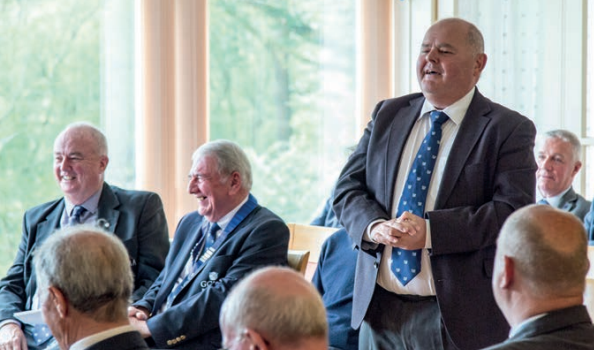The Yorkshireman is about to step into the hotseat as the GCMA’s new national captain. So what does he want to get out of his year, and what does he think about the role and the GCMA?
Congratulations on becoming national captain. How do you feel about getting the role?
I’m obviously very honoured, not just for me but also for the Yorkshire region. It’s 15 years, I think, since (our last Yorkshire national captain) John Nicholson. It’s something I am really looking forward to. I think I’ve got something like 80 days planned from now until the end of October. It’s a big role but one I am really looking forward to.
You’re going to continue as the Yorkshire regional manager. How are you going to do that as well?
Well, that role isn’t quite as onerous as some may make out – even though I think we have a good region and we run a lot of meetings, alongside the work that goes into those meetings. We only have a few matches. We’ve been talking about regional committees and some of those members are stepping in to run a couple of those events – really from start to finish.
Last year, the regional captain Ian Brogden did the whole of the build up to the Christmas meeting. It was snowed off but he did all the work and it would have been well organised on the day.
I was away and that was really a trial run, and the committee are stepping in and they are going to run two of the events where there is a clash – although I will get to every Yorkshire regional event. I also feel that I am going to be sat in hotel rooms on my own a lot – the night before or after (an event) and I will sit at the computer. There will be time to do the work, just as I do now.
How do you see the role of captain and what do you want to achieve from your year?
When you are offered the position, you are given two pages of A4 which tells you what the role is. What it really does is tell you what events you are expected to attend. It doesn’t tell you what your actual role is and whether you have any involvement in the running of the association.
I personally tried very hard, when I was in club management, to change the role of club captain from being the main person running the golf club to being the person who is the ambassador for the club, the team captain for the club. I would like to think that’s what I am going to be doing for the GCMA – even though I will be attending board meetings, I don’t have a vote at those meetings.
My own nature will mean that if I am given the opportunity to speak then I will do. But, personally, I feel the role should be an honorary position and a reward for the work you have done for the association.
Yes, you’ve got to be somebody who can be the ambassador but I don’t think you should have that much input into the running of the association.
I ask because you come in at an interesting time for the GCMA – with the strategic review and a number of changes being planned to the regions among other things. If you wanted to, you could have quite a say…
At the recent regional managers’ conference I certainly did have my say, but from a regional manager’s point of view not from the incoming captain’s.
Although I feel the captain shouldn’t be a major player in the running of the organisation, because of my long-standing involvement – being on the national committee in the old days for five years and involved in the changing of the name and being a regional manager for six years – I will still have that role. Whether that will be me as captain, or as a regional manager, is a fairly blurred area in my specific case.
It will be quite a juggling act then: when you have your captain’s hat on and when your regional manager’s hat is on?
Certainly at regional meetings, the difference will be that I will be able to give my own personal views. The chief executive will be giving the national position and I will be giving my personal position. I will also have to juggle and wear different hats at the meetings where I am there without Bob and I will promote and be the ambassador for the national positions. I sit on the national and the board committee and, as a committee member, I will follow that line and be ambassador in both positions.
What opportunities are in front of the GCMA? What are you looking forward to see coming to fruition as captain?
We need to raise our profile, and I don’t mean within other bodies, I mean within golf clubs themselves. That’s where our biggest challenge is. Golf club committees are still almost totally unaware of the GCMA. Yes, it helps that we are involved in R&A committees and England Golf committees, along with the other national bodies.
But we’re still not getting down to the grassroots. We need to get into golf clubs and into committees – certainly within Yorkshire we try to get committee members to come along to meetings. When we have specific subjects, such as food and beverage last year, we invited the house managers and committee members to come along and we managed to get 90 people at that full day seminar. That had a great impact on awareness within those golf clubs. We need to do much more of that.
The proprietary market appears to be an untapped resource…
It is. I am very pleased to see that Bob Williams is having meetings with the UK Golf Course Owners Association and we are trying to build links with them. I hope that is successful. It’s an area I didn’t work in. I worked in the private members’ sector and we don’t have that much input regionally from the corporate sector. But it is something that we should, and must, work towards getting.
Do you feel positive about the strategic review?
The GCMA are clearly moving forward… Yes. Seeing that develop over the last couple of years, I have seen the willingness of the board and the chief executive to be flexible. If things haven’t worked, they have tried something else. I think we are getting there. We are certainly getting there with the magazine and the electronic communications systems we are now providing. I do hope we keep our focus on our main goal, which is education and looking after the membership, and that finance doesn’t take over.
I imagine that’s one of the huge shifts you have seen during your time in the GCMA – from regional meetings being essentially a social event to CPD being at the heart?
The education we provide at regional meetings is now almost total. At the regions that I have attended – Yorkshire, North West and Northern – education has taken over from the selling aspect. Some regions used to take the easy way out. They would be given a list of sponsors from the national body and would run down and say ‘I’ll have them, them and them’.
They’ll provide a talk but there’s no real structure as to whether it’s educationally beneficial or whether it’s just a way of paying for the meeting. That has certainly changed within the area, within the region, since I’ve been associated with it.
What are the GCMA’s biggest challenges at the moment?
From a positive point of view, I think we are victims of our own success in as much as our communication and education, from a national level through electronic communication, has been transformed over the last few years. We still need to provide the education to the members on a one-to-one basis. Clubs have become much more business-like, which is something for which we have been striving for many years. The downside of that is club committees are much more aware of the time managers and secretaries are spending at the club.
They are having a negative influence on allowing them out. We all know that education is key to moving forward in management and the success of clubs. But clubs are very short sighted in seeing the actual time taken away from the club for education.
They still say ‘it’s just a jolly’ too often. Even though every region offers a seminar-only aspect of the day and golf is only optional. I don’t know of any region that would say ‘you have to play golf if you are attending a meeting’. The education takes precedence.
If I could give you one objective you want to achieve during your year in office, what would that be?
I have dreams, but I don’t think they are objectives. I would dream that equality comes much more to the forefront. It’s 100 years since women got the vote, it’s 10 years since the Equality Act became law – but how many clubs have embraced it or found ways round it?
Most clubs are now charging equal subscription rates but very few have embraced it totally.
My ideal end result – and it is a pipedream and I know it is – would be ‘you are a member of a club’. Gender, or anything else, is totally immaterial. You’d have a handicap based on which tees you played from – and that’s everybody.
Competitions are competitions. Male only, female only – everything just disappears and you go and you play golf. It’s only the professional game that needs to differentiate. Keighley, where I was manager, was one of the first traditional members’ clubs to fully integrate and if you want to play golf down at Keighley in a competition it doesn’t matter whether you are a man or a woman. You just put your name down to play.
Is it disappointing we’re still not fully integrated?
I am hugely disappointed, yes. It took 10 years back in the Suffragette days and it took 10 years to move it from 35-year-olds owning property to 25-year-olds being able to vote. It took quite a bit longer before every woman got the vote. I hope it doesn’t take us anywhere near as long to reach the same position in golf.
I want to get people thinking and stopping all the negative arguments, which, no matter how you look at it, are still prejudiced points of view. The negative arguments are ‘we’ll lose lady members’, ‘the lady members have voted not to do this’. That was not what the act was about. It clearly says you shouldn’t give them that choice and the law is the law.
You also want to look at the selection of national captain…
I may end up running the past captain’s meetings later this year and having them not talking to me if I gave my views in public as strongly as I feel. We, as an association, and as most of the enlightened managers, have been trying to move the management of golf clubs forward and move from committees of 20 to manageable ones of four, five or six people. We’ve pushed club captains into becoming just that – not men’s captains that automatically ran the golf club while the ladies’ captain was on the side.
But a group of old men sit down and decide which one of their mates is going to be captain next year. We, as an association, still do that. When we meet later this year, we will have a game of golf, sit round a dinner table and discuss a list of names. Whoever comes out on top of that list of names will become captain. In the history of the association, as far as I am aware, no captain that has been selected has not been elected.
So are you proposing an election of the membership?
Yes, a much more open and easier way into the position. Hopefully that would see some younger people, and more women. I’m sure it won’t be popular and I’m sure it won’t happen. I would certainly like to move towards that. Make the position more attainable.
We’ve got 16 regions and it should be passed around the regions a little bit more.
So one of the criteria should be ‘it’s the turn of the South West’. They still have to come up with a suitable candidate but the regions should be pushed a little bit more towards putting candidates forward.
I have accepted the role knowing I am going to be doing 80 or 90 days.
Maybe that has to be looked at. I was one of the people at the regional managers’ meeting who said ‘we really want to see the captain at least one of our meetings every year’. As a result, the commitment is huge.
Are you looking forward to the year?
Hugely. I am getting prepared and I am really looking forward to it.



